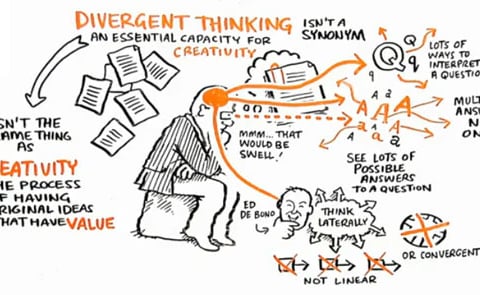
Mastering Change: The Power of Continuous Adaptation Psychology in Today's World
In today's fast-paced world, mastering the art of change is not just a skill—it's a necessity. Continuous adaptation psychology empowers individuals and organizations to thrive amidst constant flux. This approach emphasizes the importance of staying agile, open-minded, and resilient in the face of new challenges.


In a world where the only constant is change, the ability to adapt has become more than just a survival skill; it is a crucial pillar of success. Imagine navigating through an unpredictable landscape—emerging technologies, shifting social norms, and evolving personal challenges—all while maintaining your equilibrium. This dynamic environment demands not just resilience but also an understanding of continuous adaptation psychology: the art and science behind our capacity to adjust, thrive, and even flourish amidst uncertainty.
Mastering this intricate dance of adaptation can unlock unparalleled opportunities for growth and innovation in both our professional and personal lives. Rather than viewing change as an obstacle to overcome, what if we saw it as a canvas for creativity? By delving into the principles of continuous adaptation psychology (CAP), we can harness its transformative power to navigate life's twists and turns with confidence and purpose. Join us as we explore actionable strategies that will empower you to thrive in this era of relentless change.
Understanding CAP: A Key to Thriving in a Rapidly Changing Environment
In today's fast-paced world, understanding continuous adaptation psychology is not just beneficial—it's essential. The ability to adapt swiftly and efficiently to change defines success in both personal and professional realms. At the heart of this lies psychological flexibility, a cornerstone of adaptation psychology that empowers individuals to navigate uncertainties with grace.
Psychological flexibility involves the capacity to shift perspectives and approaches in response to changing circumstances, ensuring that we remain resilient amidst challenges. This skill is crucial for effective change management, as it enables us to embrace new information and adjust our strategies accordingly. By cultivating adaptability skills, we become adept at anticipating changes and responding proactively rather than reactively.


Moreover, developing robust coping strategies is integral to thriving in a rapidly changing environment. These strategies not only bolster our mental resilience but also enhance our problem-solving capabilities, allowing us to tackle unforeseen obstacles with confidence.
Investing time in understanding adaptation psychology equips us with the tools needed for continuous growth and success. It transforms potential hurdles into opportunities for innovation and progress, making it an invaluable asset in today’s ever-evolving landscape. Embrace this transformative approach and watch as you thrive amid change with ease and assurance.
Psychological Adaptation Theory: How Our Minds and Behaviors Evolve with Change
Adaptation is an incredible testament to the human mind's resilience and ingenuity. At its core, the psychological adaptation process involves our ability to adjust our thoughts and behaviors in response to new challenges or environments. This isn't just a surface-level change; it is deeply rooted in the neuroscience of adaptation, where our brains actively rewire themselves to accommodate new information and experiences.
Cognitive flexibility plays a crucial role in this process. It allows us to shift our thinking, embrace alternative strategies, and view problems from multiple perspectives. This mental agility is not only essential for personal growth but also for thriving in an ever-changing world. By enhancing cognitive flexibility, we become better equipped to handle uncertainty and complexity with ease.


Moreover, understanding the behavioral change mechanisms involved in adaptation can empower us to take control of our development proactively. These mechanisms include learning from past experiences, setting realistic goals, and maintaining a positive outlook amidst adversity. By leveraging these tools, individuals can navigate change more effectively and emerge stronger on the other side.
In essence, adaptation is not merely about survival; it’s about thriving through transformation. Embracing this science-backed perspective enables us to harness the full potential of our minds as we evolve alongside life's inevitable changes.
The Role of Continuous Adaptation in Personal Development and Mental Health
In the ever-evolving landscape of life, continuous adaptation emerges as a cornerstone of personal development and mental well-being. Embracing personal growth through adaptation not only empowers individuals to navigate change with confidence but also fortifies their resilience against life's inevitable challenges. By cultivating adaptive coping strategies, we equip ourselves with the tools necessary to manage stress and uncertainty effectively.


The mental health benefits of adaptability are profound. Those who adapt readily to new circumstances often experience reduced anxiety levels and a greater sense of control over their lives. This is because adaptability encourages a mindset that views change as an opportunity for growth rather than a threat. As we become more adept at adjusting our thoughts and behaviors in response to new situations, we build resilience—an essential quality that helps us bounce back from setbacks stronger than before.
Ultimately, fostering an adaptable mindset is not just about surviving; it's about thriving in an unpredictable world. By prioritizing continuous adaptation in our personal development journey, we open ourselves up to a wealth of opportunities and experiences that enrich our lives and enhance our mental health.
Applications of CAP in the Workplace
In today's fast-paced and ever-evolving business landscape, the ability to adapt is no longer just an advantage—it's a necessity. Continuous Adaptation Psychology offers groundbreaking insights into how organizations can foster workplace adaptability skills among their employees, ensuring they remain agile in the face of change. By integrating these principles into change management strategies at work, companies can better prepare their teams to handle transitions smoothly and efficiently.
One of the key applications of Continuous Adaptation Psychology is in employee resilience training. By equipping employees with the tools to manage stress and uncertainty, organizations empower them to navigate challenges with confidence. This not only boosts individual morale but also enhances overall organizational behavior and change readiness.


Moreover, understanding the psychological aspects of adaptation helps leaders tailor their approaches to meet diverse employee needs during periods of transformation. This personalized approach ensures that all team members feel supported and engaged, ultimately leading to more successful outcomes.
By embracing Continuous Adaptation Psychology, businesses can create a dynamic environment where change is seen as an opportunity rather than a threat. This shift in perspective encourages innovation and positions companies for long-term success in an unpredictable world.
Cultivating a Mindset for Continuous Adaptation: Tips and Techniques for Success
In today's fast-paced world, cultivating a mindset for continuous adaptation is not just beneficial—it's essential. Embracing a mindset shift towards adaptability can empower you to navigate the ever-evolving landscape of both personal and professional life with confidence and poise. But how do we foster such flexibility?
One effective technique for enhancing psychological flexibility is to practice mindfulness. By staying present and aware of your thoughts and emotions, you can better understand your reactions to change and learn to manage them constructively. This awareness allows you to respond rather than react, making it easier to adapt when circumstances shift unexpectedly.


Another practical tip for adapting to change is setting small, achievable goals that align with your broader objectives. This approach not only provides a sense of direction but also fosters resilience by allowing you to celebrate incremental successes along the way.
Additionally, seeking feedback from others can be incredibly valuable. Constructive criticism opens up opportunities for growth by highlighting areas where adaptation may be needed. By actively listening and applying this feedback, you enhance your ability to adjust strategies effectively.
Ultimately, developing a mindset geared towards adaptability requires commitment and practice. However, by integrating these techniques into your daily routine, you'll find yourself better equipped to handle whatever changes come your way—transforming challenges into opportunities for growth and success.
The Future is Uncertain: Why Embracing Continuous Adaptations is Crucial Now More Than Ever
In today's rapidly evolving world, the importance of adaptability in future challenges cannot be overstated. As we navigate an era marked by technological advancements, economic fluctuations, and global shifts, the ability to adapt has become a vital skill for individuals and organizations alike. Preparing for uncertainty with adaptation psychology offers a strategic advantage that empowers us to thrive amidst change.


Adaptation psychology teaches us to embrace flexibility and resilience, enabling us to respond effectively to unforeseen circumstances. By cultivating an adaptive mindset, we are better equipped to pivot strategies and seize new opportunities as they arise. This proactive approach not only mitigates risks but also fosters innovation and growth.
The future is inherently unpredictable, making it crucial for us to prioritize adaptability as a core competency. By doing so, we can confidently face whatever challenges come our way and ensure continued success in an ever-changing landscape. Embracing continuous adaptation is not just a strategy—it's a necessity for thriving in the uncertain times ahead.
Take the First Step Towards Embracing Change with CAP
The first step towards embracing this transformative approach is acknowledging the inevitability of change and committing to personal growth. Start by setting small, achievable goals that encourage adaptability in your daily routine. Reflect on past experiences where adaptability led to success and use those insights to fuel future endeavors.
Remember, the journey of embracing change begins with one decisive step forward. By integrating continuous adaptation psychology into your life, you're not just preparing for the future—you're actively shaping it. Take that first step today and unlock your potential for lasting success in an ever-changing world.
Frequently Asked Questions (FAQs)
Q1: What is the difference between psychological adaptation and resilience?
A: Psychological adaptation refers to the ongoing process of adjusting to changes, while resilience is the capacity to bounce back from adversity. Adaptation is the mechanism through which resilience is built.
Q2: How long does it take to develop better psychological adaptation skills?
A: The development timeline varies by individual, but consistent practice of adaptation strategies typically shows measurable improvements within 8-12 weeks. However, it's a continuous process of growth and refinement.
Q3: Can psychological adaptation be measured?
A: Yes, through various psychological assessments, behavioral observations, and self-report measures. Common metrics include stress levels, coping mechanisms, and adjustment outcomes.
Q4: How does continuous adaptation affect mental health?
A: Effective adaptation is associated with better mental health outcomes, reduced anxiety, lower depression rates, and improved overall psychological well-being.
Q5: What role does environment play in psychological adaptation?
A: Environment significantly influences adaptation by providing contexts and challenges that require adjustment. Both social and physical environments shape adaptive responses.
Discover tips for sleep, detox, and mindfulness.
© 2024. All rights reserved.
